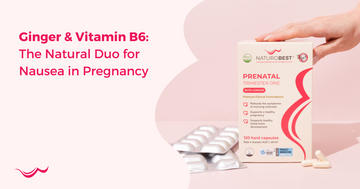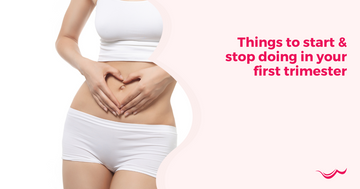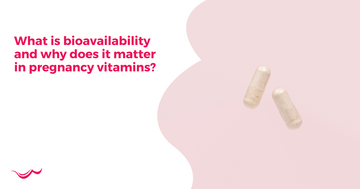10 Common First Trimester Pregnancy Symptoms
by NaturoBest Naturopath Team on May 31, 2024

Navigating the early signs and symptoms of pregnancy can be tricky.
Am I? Aren't I? Is this just premenstrual syndrome? Or maybe you just got that positive test? Congratulations!
If you're sitting in bed scrolling your phone, searching for other women's stories of early pregnancy symptoms - we have you covered. NaturoBest is here to help you make sense of those wild and wonderful first trimester symptoms.
Key Takeaways:
· Frequent urination
· Sore and swollen breasts
· Mild cramps
· Morning sickness
· Fatigue
· Cravings
· Constipation
· Heartburn
· Spotting
· Mood swings
If you're wondering about early pregnancy symptoms, you may also be wondering when pregnancy actually starts. The date of your pregnancy will be calculated from the first day of your last menstrual cycle. This means you may already be a few weeks into your first trimester by the time you start experiencing symptoms.
Here are some of the most common symptoms:
Urinating more frequently
This is a tell-tale sign of early pregnancy before a woman has even done a pregnancy test. Many women may start getting up to go to the toilet in the middle of the night and this often continues throughout pregnancy. Eliminating caffeine may help as caffeine is a diuretic.
Sore and swollen breasts
This is probably one of the first signs a woman will notice, although it's not uncommon to experience this in the premenstrual period anyway so a lot of women ignore this symptom. Wearing a well fitted, comfortable, wire-free bra may help to reduce discomfort throughout pregnancy.
Mild cramps or pains in the uterus
Many women panic at the feeling of mild cramps or ovulation-like pains. In early pregnancy, this is usually nothing to worry about. "Growing pains" of the uterus is usually the culprit, as the uterus begins to accommodate the foetus.
Nausea, vomiting or a sudden repulsion of certain foods
Morning sickness usually commences around week 6 of pregnancy and subsides around week 14-16. For a small percentage of women, they may experience nausea throughout the entire pregnancy. Eating frequent, small meals can help, along with taking vitamin B6 and ginger daily.
Avoid iron supplements in the first trimester. Studies have shown that iron supplements aggravate the symptoms of nausea and vomiting.
Choose a prenatal multi that is tailored for the first trimester, such as NaturoBest's Prenatal Trimester One with Ginger. This is a great way to support a healthy pregnancy, with essential nutrients such as active folate, iodine and natural vitamin B12. This prenatal vitamin and mineral supplement was designed specifically for the first trimester as well as for morning sickness relief, with the addition of 75mg of vitamin B6 and 1300mg of ginger.
Tiredness
This is one of the symptoms that makes life difficult in the first trimester. During those early weeks of pregnancy, a woman may experience fatigue like she has never experienced before. Despite this, her energy levels should pick up again in the second trimester.
Cravings for certain foods
This can occur throughout pregnancy, although a woman should seek medical advice if she has weird cravings for dirt or clay. This can indicate a condition called 'pica', a sign of severe iron deficiency.
Constipation
Constipation is common in the first trimester and throughout pregnancy. Rising progesterone levels is the most common cause of pregnancy constipation. Increasing your dietary fibre intake, staying hydrated and exercising can help. You can also try eating 2 kiwifruits at night after dinner.
Heartburn
This may occur in the first trimester, although it is more common in the third trimester. Try drinking peppermint tea and stay upright for at least an hour after eating food.
Spotting
Spotting is quite common, but heavy bleeding or pain is not normal. We recommend seeking medical advice for any bleeding during pregnancy.
Mood swings
Mood swings are common in the first trimester and throughout pregnancy. Mood swings are often caused by changes in hormone levels.
To relieve some of that moodiness, try aiming for 8 hours sleep, daily exercise and eat a well-balanced diet. This means plenty of vegetables, 3 pieces of fruit daily, protein and wholegrains. Try to avoid refined carbohydrates such as lollies, soft drinks, biscuits, and cakes.
Click here for Nikki's top tips on how to reduce morning sickness naturally.




